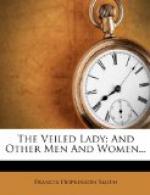“Bad! Oh, Joe, you don’t know. I said, last week, when I forced my way into the room of that poor mother whose son was arrested, that I’d never report another case like it. But you ought to have seen what I saw to-night. The poor girl worked in a box factory, they told me, and this man hounded her, and in despair she threw herself overboard. The room was full when I got there,—policemen,—one or two other reporters,—no woman but me. They had brought her in dripping wet and I found her on the floor,—just a child, Joe,—hardly sixteen,—her hair filled with dirt from the water,—the old mother wringing her hands. Oh, it was pitiful! I could have flashed a picture,—nobody would have cared nor stopped me,—but I couldn’t. Don’t you see I couldn’t, Joe? He has no right to ask me to do these things,—nobody has,—it’s awful. It’s horrible! What would that poor mother have said when she saw it in the paper? I’ll go home now. No, you needn’t come,—they’ll want you. Go back upstairs. Good-night.”
Joe watched her until she caught an uptown car, and then turned into the side door opening on the narrow street. A truck had arrived while they were talking, and the men were unloading some great rolls of paper,—enormous spools. “What would dad say if he saw what his trees had come to?” Joe thought, as he stood for a moment looking them over,—his mind going back to his father’s letter. One roll of wood pulp had already been jacked up and was now feeding the mighty press. The world would be devouring it in the morning; the drowned girl would have her place in its columns,—so would every other item that told of the roar and crash, the crime, infamy, and cruelty of the preceding hours. Then the issues would be thrown away to make room for a fresher record;—some to stop a hole in a broken window; some to be trampled under foot of horse and man; many to light the fires the city over.
“My poor trees!” sighed Joe, as he slowly mounted the steps to the top floor. “There ain’t no common sense in it, I know. Got to make sumpin’ out o’ the timber once they’re cut down, but it gits me hot all the same when I think what they’ve come to. Gol-darn-shame to serve ye so! Trees has feelin’s, same’s men,—that’s what dad says, and that’s true!”
Miss Parker had done her work. Joe saw that when he opened the paper the next morning: saw it at a glance, and with a big lump in his throat and a tightening of his huge fists. Flaring headlines marked the first page; under them was a picture of the girl in a sailor hat,—she had found the original on the mantel and had slipped it in her pocket. Then followed a flash photo of the dead girl lying on the floor,—her poor, thin, battered and bruised body straight out, the knees and feet stretching the wet drapery,—nothing had been left out. Most of the details were untrue,—the story of the lover being a pure invention, but the effect was all right. Then, again, no other morning journal had more than a few lines.




